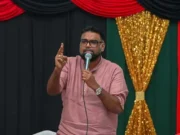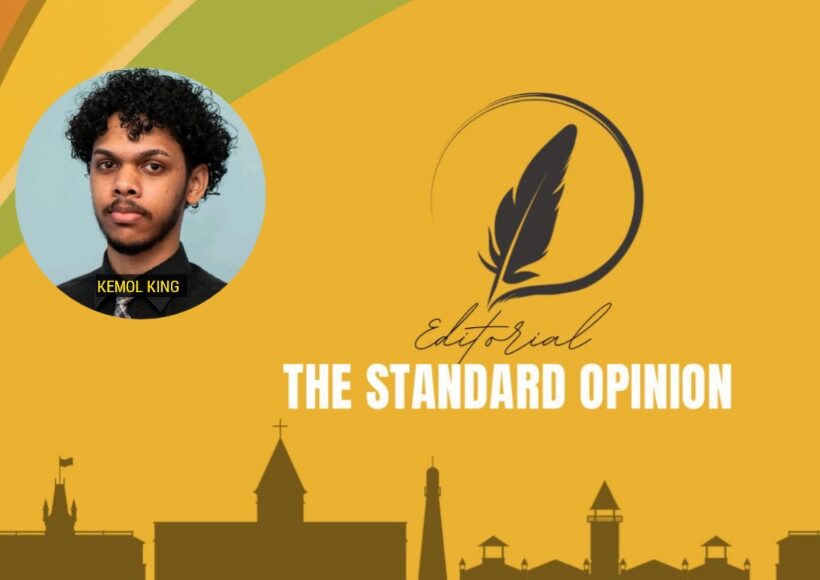By Kemol King
Ever tried talking to a man about safeguarding his mental health? Chances are, you are more likely to get a genuine answer when you speak with him one on one. Talk to two men and you are less likely to get a genuine acknowledgement that men have to do better safeguarding their mental health. The bigger the group you talk with, the more likely the macho performance is to override any genuine conversation.
Does this reluctance by some to engage in honest, vulnerable conversations spell trouble for this demographic’s ability to build community? And what does this mean for Guyana, a country once considered the suicide capital of the world, whose victims of that crisis were mostly men?
Modern movements show men build community just fine, but more often around strength, not vulnerability. There is a vast online network of communities, informally referred to as the manosphere, focused on men and masculinity, and it transcends nations and borders. While it builds community, the manosphere is plagued by subcultures that are controversial for placing many men in opposition to modern social movements like female empowerment.
Take Andrew Tate, for instance. The kickboxer turned social media personality has more than 10 million followers on X (formerly Twitter), where he condemns women to servile roles in relationships and says men should not be enamoured with them because that’s “gay”. Tate and his brother Tristan were indicted in Romania, currently facing charges of rape and human trafficking—to name a few.
The manosphere is also populated with male podcasters. One of the most popular is the Fresh and Fit Podcast, run by Walter Weekes and Myron Gaines. They have been soundly criticized for promoting toxic masculinity and sexist views, including positing that it is okay for men to “sleep around” while comparing women who do the same to used cars. The Fresh and Fit Youtube page was famously demonetized in 2023 for repeated violations of the platform’s community guidelines.
Another controversial subculture in the manosphere is the community of incels. Incel, short for involuntary celibate, describes a person, typically male, who is disgruntled by lack of sexual experience and opportunity. Self identified incels, opposed to modern feminism, believe that women are too sexually selective and weaponize their sexuality for social mobility. In 2017, social media site Reddit banned an incel community of more than 40,000 members for violating its rules regarding violent content.
These are just a few, but are the more striking elements of the manosphere. The communities see people as either being redpilled or bluepilled. The terms are derived from the 1999 film ‘The Matrix’ in which a character has the choice to take the red pill, which would open his eyes to uncomfortable realities, or the blue pill, keeping him in blissful ignorance.
In the case of the manosphere, being redpilled means you have opened your eyes to see that society benefits women at the expense of men.
The manosphere is often seen as a reaction to the progress of movements for gender equality.
Women today are becoming more educated, more wealthy, more independent, and more sexually liberated. But why does this affect men? Men’s identities have a lot to do with how they see themselves in relation to women. In a nutshell, men don’t know who they are without women.
The traditional idea that men are entitled to a certain lifestyle, with dominion over their female partners, goes up in flames when they find female suitors who reject, either wholly or in part, the kind of subservience they expect.
This conundrum is reflected in the sociopolitical views of men and women across the globe. Richard Reeves, founding president of the American Institute for Boys and Men (AIBM) and a non-resident Senior Fellow at the Brookings Institution explained in April how divided the sexes are. Reeves said some 38% of Republican men in the U.S. believe the gains women have made in society come at the expense of men.
He referred to Gallup data which shows that even though younger generations of Americans are more liberal, a political chasm is opening up where women are significantly more liberal than their male counterparts, so much that it is five times wider than in 2000. Similar divides have been observed in Germany, the United Kingdom, China, Tunisia, South Korea and Brazil.
While the manosphere and its associated ideologies are largely global in nature, the underlying issues they highlight—such as struggles with identity, vulnerability, and societal expectations—are not absent in Guyana. These dynamics suggest that harmful ideologies could find fertile ground without targeted interventions and community-building efforts.
President Dr. Mohamed Irfaan Ali’s Men on a Mission initiative aims to address toxic masculinity by creating safe spaces for men and promoting values such as integrity, productivity, and accountability. At its launch, President Ali acknowledged that “we men are the root cause of many problems in society. It is now our time to be the root of solution.” While commendable, this and other efforts need to be underpinned by robust research into men’s ideologies, struggles, notions of masculinity, sexuality, and mental health to achieve meaningful impact.
Other jurisdictions’ findings cannot be cut and pasted into a Guyanese context. However, the similarities across jurisdictions would lend credence to the need for more research on how gender impacts social dynamics in Guyana. Understanding these issues in the Guyanese context could help harness positive community-building strategies for men. Importantly, it could also uncover the factors contributing to the radicalization of men, as seen in the manosphere. By understanding these issues in a Guyanese context, policymakers and advocates could design targeted interventions to address men’s mental health, counteract harmful ideologies, and reduce gender-based violence.













